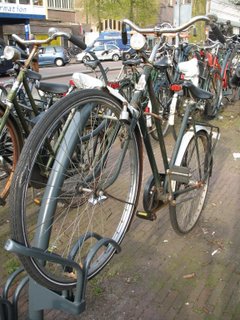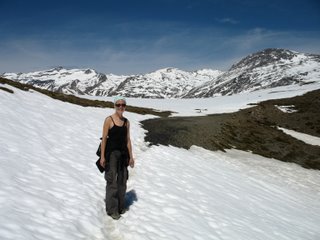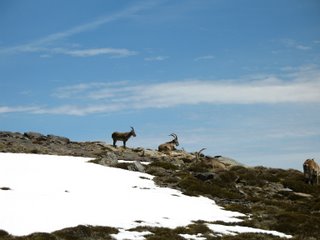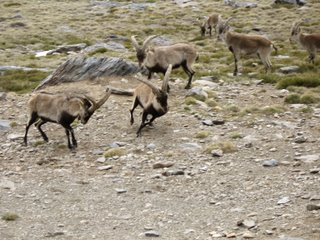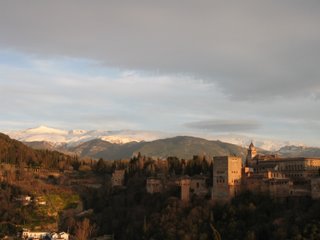 Across the Universe?
Across the Universe?A few days ago,we took a break from our regimen of two-a-day yoga classes and did some exploring around Rishikesh. For centuries, pilgrims and 'holy people' have come here to meditate and pay homage to the Ganges. Ashrams (religious living and study centers) dot both sides of the river. Many people claim that Rishikesh is one of the world centers for the study of yoga so Tami and I decided to focus on that while we're here and get in a bit better shape. I can vouch for it's effectiveness. I feel better than I have in months. Yoga is hard work.
Positive results notwithstanding, a break was in order. Other than yoga, meditation, reading and some light, outdoor recreation, there isn't a lot to do in Rishikesh. Like Indians, foreign travelers come seeking peace or focus. Some come just to take a break from the mass of humanity India can impose. People from the West haven't been journeying to Rishikesh for so long. That changed just over thirty-eight years ago. In February of 1968, four young men in their twenties along with some friends hopped a plane in London and came here to study with the Maharishi Mahesh Yogi (
link).
Searching for something more 'transcendental' or meaningful than the global adoration and financial success that their music had brought them, the Beatles camped out for several weeks at the Maharishi's ashram. Most Beatles fans know the story. Led by George Harrison and John Lennon, the group agreed to explore the teachings of the Maharishi and his practice of Transcendental Meditation.
I knew the story as well but my interest was piqued by a French fellow we met on the train from Delhi. He'd spent a lot of time in Rishikesh and said one of his favorite diversions was wandering around the now abandoned ashram. The afternoon we went to find it, the temps were well above a hundred degrees. We shuffled through the heat passing the last buildings along the Ganges. At the south end of 'town', we saw a small, hand-lettered sign that said "Beatles Ashram - 100 Meters". The road petered out to a trail then died into a rocky river wash. Up the wash, we saw some wierd, conical gate towers among the forest.

Behind the gate, a bent old man sat on a bench staring at the ground. He looked like one of the ubiquitous sadhus (wandering Hindu 'holy' men) you see everywhere in India. His clothes were loose and unkempt and he had a yellow and red stained bandage over the stump of where the last digit of his left index finger should have been. As I stood a dozen feet away, he didn't look up. He kept taking slow, resigned drags from his 'bidi' (bad smelling, cheap, Indian cigarettes) staring vacantly at the ground. This was a little odd. I knew he was there, officially or otherwise, to try get some money from anyone who wanted to enter. After some time I called out, "My friend!". He looked up and, continuing his vacant stare at me, finally communicated that it would cost us twenty rupees (about 45 cents) to get in. He shuffled over to the gate, jiggled the pad lock and dangled the key in front of me. Because there was no apparent infrastructure for visitors and he had no uniform I was sure this was a just another Indian shakedown.
I walked away and surveyed the wall around the encampment. We could have hopped over at a couple of places but, given that this was his turf, I decided to avoid a confrontation. I went back and offered ten rupees. Without looking up from his bench, he took long drag on the bidi and a couple breaths later, shook his head and held fast; twenty. I know that's not much cash but he and I both knew he had no legal authority to do this. He was just fleecing us. Even if expediency directed me to play along, in the domain of the black market, negotiation is always accepted. He wasn't being reasonable.
I walked away and surveyed the walls again. I knew we could have easily argued him down if he tried to do anything to stop us once we were in. There were, however, a couple dozen other sadhus a stone's throw down the river wash. Not knowing if they'd come to his aid if they heard a confrontation, I decided to pay the twenty and go in.
I had no idea what to expect (a helpful survival posture in India, btw). Ashrams come in all shapes and sizes. Some acommodate just a few dozen people, some thousands. I also didn't know how long it had been since the Maharishi's had been occupied. At the minimum, I hoped to find some relic establishing the Beatle's presence here, something to bridge the gap of time between their visit and my own. My main reason for having any hope was how far we were from where most pop fans would be willing to tread. How many Beatles fans have posed in the zebra stripe crossing of Abbey Road (
link)? So many, I think, that any sense of unique 'communion' with the creative energy of the Boys must have been flushed decades ago. Of course the chances of touching or feeling anything 'inspirational' thirty-eight years down the line might be just as far fetched even here but, because few can make the journey and even fewer have a similar motivation, I didn't feel silly for being hopeful.
 Meditation Buildings
Meditation BuildingsIt wasn't just that the Beatles had been on this ground. They came, unpacked their bags and made this their collective home for a month and a half. During their stay they wrote all the songs that would eventually make up the 'White Album' and much of 'Abbey Road'.
 "Number 9?"
"Number 9?"The visit didn't turn out as the Beatles had hoped. Due to some questionable behavior on the part of the Maharishi (
link), John and George (the final two Beatles remaining) and the last of the entourage hastily packed and left the ashram. John said later,
"There is no guru. You have to believe in yourself. You've got to get down to your own God in your own temple. It's all down to you, mate." For our part, Tami and I had a hell of a day. The whole thing was like a spooky treasure hunt. We found strange meditation buildings that would merit historical preservation status on their own (see Tami's blog). We dodged monkeys and and a bat. I reflected on the comingling of cultures and how those have evolved since 1968. I thought long and hard about muses and gurus, pop and otherwise. For sure we had a day we'll both remember for a long time.






